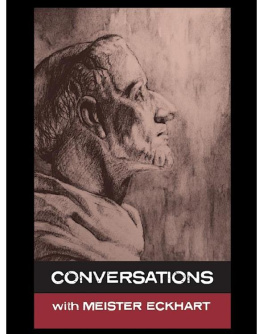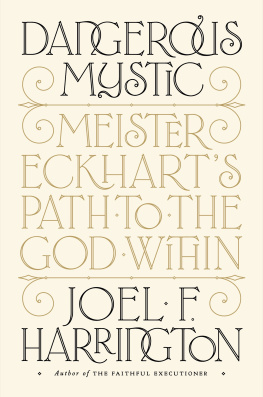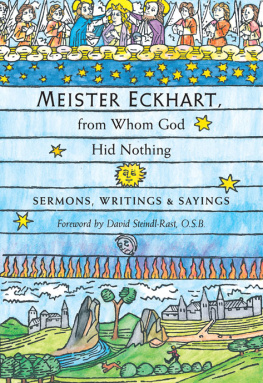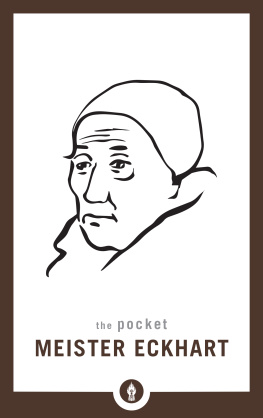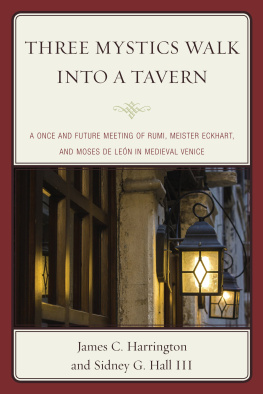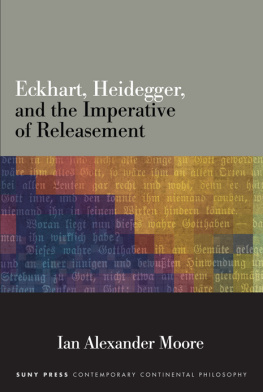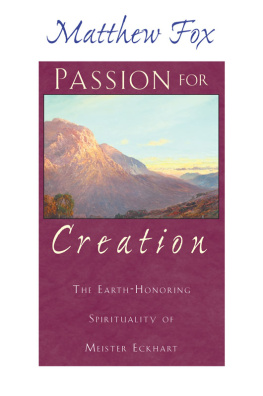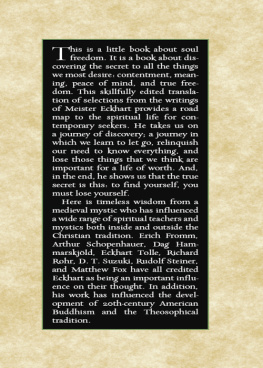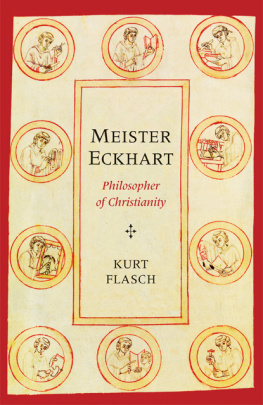Meister Eckhart - Selected Sermons
Here you can read online Meister Eckhart - Selected Sermons full text of the book (entire story) in english for free. Download pdf and epub, get meaning, cover and reviews about this ebook. genre: Science. Description of the work, (preface) as well as reviews are available. Best literature library LitArk.com created for fans of good reading and offers a wide selection of genres:
Romance novel
Science fiction
Adventure
Detective
Science
History
Home and family
Prose
Art
Politics
Computer
Non-fiction
Religion
Business
Children
Humor
Choose a favorite category and find really read worthwhile books. Enjoy immersion in the world of imagination, feel the emotions of the characters or learn something new for yourself, make an fascinating discovery.

- Book:Selected Sermons
- Author:
- Genre:
- Rating:4 / 5
- Favourites:Add to favourites
- Your mark:
- 80
- 1
- 2
- 3
- 4
- 5
Selected Sermons: summary, description and annotation
We offer to read an annotation, description, summary or preface (depends on what the author of the book "Selected Sermons" wrote himself). If you haven't found the necessary information about the book — write in the comments, we will try to find it.
Selected Sermons — read online for free the complete book (whole text) full work
Below is the text of the book, divided by pages. System saving the place of the last page read, allows you to conveniently read the book "Selected Sermons" online for free, without having to search again every time where you left off. Put a bookmark, and you can go to the page where you finished reading at any time.
Font size:
Interval:
Bookmark:
HEART AND LIFE BOOKLETS. No. 22
MEISTER
ECKHART'S
SERMONS
FIRST TIME TRANSLATED INTO ENGLISH
BY
CLAUD FIELD, M.A.
LONDON: H. R. ALLENSON, LTD.
RACQUET COURT, 114 FLEET STREET, E.C.
__________________________________________________________________
__________________________________________________________________
Title: Meister Eckhart's Sermons
Creator(s): Eckhart, Johannes (c. 1260-1327)
Field, Claud (Translator)
Print Basis: London, H. R. Allenson [1909?]
Rights: Public Domain
CCEL Subjects: All; Classic; Mysticism; Sermons; Proofed;
LC Call no: BV5080
LC Subjects:
Practical theology
Practical religion. The Christian life
Mysticism
__________________________________________________________________
"Meister Eckhart," who has been called the "Father of German thought," was a Dominican monk, and one of the most profound thinkers of the Middle Ages. He was born about 1260 A.D. in Thuringia, and died at Cologne 1327 A.D. In 1295 he was Prior of the Dominicans at Erfurt and Vicar-General of Thuringia. In 1300 he was sent to the University of Paris, where he studied Aristotle and the Platonists, and took the degree of Master of Arts. It is possible also that he taught at Paris.
He already had a wide reputation as a philosopher, and was summoned to Rome in 1302 to assist Pope Boniface VIII. in his struggle against Philip the Fair. In 1304 he became Provincial of his order for Saxony, and in 1307 Vicar-General of Bohemia. In 1311 he was sent again to act as professor of theology in the school of Dominicans in Paris, and afterwards in Strasburg. Everywhere his teaching and preaching left a deep mark. At Strasburg he aroused suspicions and created enemies; his doctrine was accused of resembling that of the heretical sects of the "Beghards" and "Brothers of the Holy Spirit." The Superior-General of the Order had his writings submitted to a close examination by the Priors of Worms and Mayence. The history of this episode is very obscure. It appears that Eckhart was cited before the tribunal of the Inquisition at Cologne, and that he professed himself willing to withdraw anything that his writings might contain contrary to the teaching of the Church. The matter was referred to the Pope, who, in 1329, condemned certain propositions extracted from the writings of Eckhart two years after the death of the latter.
The importance of Eckhart in the history of scholastic philosophy is considerable. At that period all the efforts of religious philosophy were directed to widen theology, and to effect a reconciliation between reason and faith. The fundamental idea of Eckhart's philosophy is that of the Absolute or Abstract Unity conceived as the sole real existence.
His God is the Theos agnostos of the neoplatonists: He is absolutely devoid of attributes which would be a limitation of His Infinity. God is incomprehensible; in fact, with regard to our limited intelligence, God is the origin and final end of every being. How then, it may be asked, can God be a Person? The answer is, that by the eternal generation of the Son the Father becomes conscious of Himself, and the Love reflected back to the Father by the Son is the Holy Spirit.
Together with the Son, God also begets the ideal forms of created things. The Absolute is thus the common background of God and the Universe. Like as the Son does, so everything born of God tends to return to Him, and to lose itself in the unity of His Being.
This theology is really Pantheism. Of the Absolute we have no cognizance but only of phenomena, but by the resolute endeavour to abstract ourselves from time and space, we can, according to Eckhart, at rare moments, attain to the Absolute by virtue of what he calls "the spark" (Funkelein) of the soul, which comes direct from God. This is really God acting in man; to know God is to be one with God. This is the final end of all our activity, and the means of attaining thereto is complete quietism. But Eckhart shrank from carrying his doctrines out to their extreme logical conclusion, though some of the more fanatical among his followers did so. On account of his insistence on the immediacy of man's approach to God, apart from Church institutions, he may be justly regarded as a fore-runner of the Reformation.
Note.--The best account of Eckhart in English is probably to be found in Vaughan's "Hours with the Mystics," vol. i.
__________________________________________________________________
ECKHART'S SERMONS
I
St John vi. 44.--"No one can come unto Me, except the Father which hath sent Me draw him."
Our Lord Jesus Christ hath in the Gospel spoken with His own blessed lips these words, which signify, "No man can come to Me unless My Father draw him." In another place He says, "I am in the Father and the Father in Me." Therefore whoever cometh to the Son cometh to the Father. Further, He saith, "I and the Father are One. Therefore whomsoever the Father draweth, the Son draweth likewise." St Augustine also saith, "The works of the Holy Trinity are inseparable from each other." Therefore the Father draweth to the Son, and the Son draweth to the Holy Ghost, and the Holy Ghost draweth to the Father and the Son; and each Person of the Trinity, when He draweth to the Two Others, draweth to Himself, because the Three are One. The Father draweth with the might of His power, the Son draweth with His unfathomable wisdom, the Holy Ghost draweth with His love. Thus we are drawn by the Sacred Trinity with the cords of Power, Wisdom and Love, when we are drawn from an evil thing to a good thing, and from a good thing to a better, and from a better thing to the best of all. Now the Father draws us from the evil of sin to the goodness of His grace with the might of His measureless power, and He needs all the resources of His strength in order to convert sinners, more than when He was about to make heaven and earth, which He made with His own power without help from any creature. But when He is about to convert a sinner, He always needs the sinner's help. "He converts thee not without thy help," as St Augustine says.
Therefore deadly sin is a breach of nature, a death of the soul, a disquiet of the heart, a weakening of power, a blindness of the sense, a sorrow of the spirit, a death of grace, a death of virtue, a death of good works, an aberration of the spirit, a fellowship with the devil, an expulsion of Christianity, a dungeon of hell, a banquet of hell, an eternity of hell. Therefore, if thou committest a deadly sin thou art guilty of all these and incurrest their consequences. Regarding the first point: Deadly sin is a breach of nature, for every man's nature is an image and likeness and mirror of the Trinity, of Godhead and of eternity. All these together are marred by a deadly sin; therefore, it is a breach of nature. Such sin is also the death of the soul, for death is to lose life. Now God is the life of the soul, and deadly sin separates from God; therefore it is a death of the soul. Deadly sin is also a disquiet of the heart, for everything rests nowhere except in its own proper place; and the proper resting-place of the soul is nowhere except in God as St Augustine saith, "Lord! Thou hast made us for Thyself, therefore we may not rest anywhere save in Thee." Deadly sin is also a weakening of the powers, for by his own power no one can throw off the load of sin nor restrain himself from committing sin. It is also a blindness of the sense, for it prevents a man recognizing how brief is the space of time that can be spent in the pleasure of voluptuousness, and how long are the pains of hell and the joys of heaven. Deadly sin is also a death of all grace, for whenever such a sin is committed, the soul is bereft of all grace. Similarly, it is the death of all virtue and good works, and an aberration of the spirit.
Next pageFont size:
Interval:
Bookmark:
Similar books «Selected Sermons»
Look at similar books to Selected Sermons. We have selected literature similar in name and meaning in the hope of providing readers with more options to find new, interesting, not yet read works.
Discussion, reviews of the book Selected Sermons and just readers' own opinions. Leave your comments, write what you think about the work, its meaning or the main characters. Specify what exactly you liked and what you didn't like, and why you think so.


